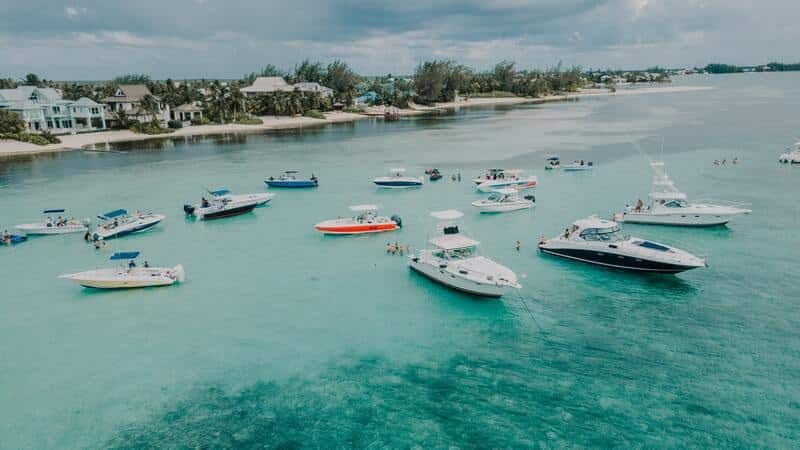Moving to the Cayman Islands can be a life-changing decision. With a growing number of people from all over the world choosing to call this tropical paradise home, the country is now experiencing a population boom.
Offering a unique combination of tropical beauty, modern conveniences, and a strong sense of community, it is no wonder that the Cayman Islands is becoming one of the hottest destinations for relocation.
Whether you are a young professional looking for new career opportunities, a family in search of a better quality of life, or a retiree seeking a tropical paradise, this blog will provide valuable insights and information to those considering a move to the Cayman Islands.
From the cost of living and job opportunities to the climate and recreational activities, we will cover all the key factors that make the Cayman Islands a desirable place to live.
If you are looking to invest as an expat or high-net-worth individual, which is what I specialize in, you can email me (advice@adamfayed.com) or WhatsApp (+44-7393-450-837).

Table of Contents
What makes the Cayman Islands an attractive place to live?
The Cayman Islands are an attractive place to live for many reasons. For one, the country is renowned for its stunning natural beauty, including white sand beaches, turquoise waters, and lush vegetation.
It also has a rich cultural heritage reflected in the island’s music, festivals, food, and art scene. It offers a variety of outdoor activities, including swimming, snorkeling, fishing, and boating.
The country also boasts of its strong and stable economy, with a focus on financial services, tourism, and real estate. It has a high-quality healthcare system, with modern medical facilities and highly trained medical professionals.
It has a tax-friendly environment, with no personal income, capital gains, or corporate tax.
Most importantly, the Cayman Islands also has a low crime rate, making it a safe place to live and raise a family.
How does the cost of living in the Cayman Islands compare to other locations?
The cost of living in the Cayman Islands can be higher compared to other locations, especially housing and consumer goods.
However, this is offset by the absence of personal income tax, capital gains tax, and corporate tax in the Cayman Islands.
Housing costs, particularly for rental properties, can be expensive, with a high demand for housing in the more desirable areas.
On the other hand, transportation costs are relatively low, as most people rely on bikes or scooters for their daily commute.
Food costs can also be higher compared to other locations, as a large portion of consumer goods must be imported. However, local produce, such as seafood, is readily available and can be more affordable.
What are job opportunities available for those moving to the Cayman Islands?
Various job opportunities are available for those moving to the Cayman Islands, particularly in the financial services, tourism, and real estate sectors.
The country is a leading offshore financial center, offering job opportunities in banking, investment management, and insurance.
The tourism industry also contributes to the Cayman Islands economy, offering job opportunities in hospitality, food and beverage, and tour guide services.
The Cayman Islands has a thriving real estate market, offering job opportunities in property management, sales, and development.
Medical professionals also have job opportunities, including doctors, nurses, and support staff. And its growing population provides opportunities in the education sector, including teaching positions in both private and public schools.
Its booming construction industry offers employment and business possibilities for building and construction trades.
In addition to these industries, there are also opportunities for entrepreneurs and small business owners in the Cayman Islands and those seeking freelance or remote work opportunities.
How do the climate and natural environment in the Cayman Islands contribute to a high quality of life?
The climate and natural environment in the Cayman Islands contribute significantly to the high quality of life enjoyed by residents.
The Cayman Islands have a warm and sunny climate, with temperatures ranging from the mid-70s to low-80s year-round. This warm weather provides ample opportunity for outdoor activities, such as swimming, snorkeling, fishing, and boating.
Because of its stunning white sand beaches and turquoise waters, the country has become a perfect setting for relaxation and recreation.
Its islands are also surrounded by lush vegetation, including tropical forests and mangrove swamps, providing wildlife habitats.
The country’s clean and safe environment is also noticeable. The country has a low crime rate and well-maintained roads and public spaces.
All these contribute to a variety of outdoor activities that residents can enjoy, including hiking, fishing, boating, and wildlife watching.
The combination of warm weather, beautiful beaches, and lush vegetation, along with ample opportunities for outdoor activities, creates an idyllic environment that contributes significantly to the high quality of life enjoyed by residents of the Cayman Islands.
What recreational activities and cultural attractions can be enjoyed in the Cayman Islands?
The Cayman Islands offer a wealth of recreational activities and cultural attractions, providing residents and visitors with ample opportunities to experience and appreciate the island’s natural beauty and rich heritage.
It is a popular destination for beach and water sports enthusiasts. It is also home to a diverse array of wildlife, including a variety of bird species, iguanas, and sea turtles, which can be observed in their natural habitats.
The Cayman Islands have a thriving culinary scene, offering a variety of international and local cuisine options, as well as opportunities for food and drink experiences, such as cooking classes and wine tastings.
The country has museums, art galleries, and historical sites, which provide insight into the island’s rich history and heritage.
The Cayman Islands also host a variety of festivals and events throughout the year, including the Cayman Cookout, the Cayman Islands International Film Festival, and the Pirates Week Festival. This provides opportunities for residents and visitors to experience the island’s rich culture.
How is the healthcare system in the Cayman Islands compared to other countries?
The healthcare system in the Cayman Islands is widely regarded as being of high quality and comparable to healthcare systems in other developed countries.
The country has modern and well-equipped medical facilities, including private hospitals and clinics, which provide a wide range of medical services and treatments. It offers specialized medical services, including oncology, cardiology, and orthopedics, which are not widely available in many other countries.
There is also an abundance of highly skilled and experienced medical professionals, giving residents access to excellent medical care.
Despite the high quality of care provided, the cost of healthcare in the Cayman Islands is generally considered more affordable than in other developed countries.
The country also has a comprehensive healthcare insurance system, which provides residents with access to quality medical care, regardless of their ability to pay.
What are the best neighborhoods for families, young professionals, and retirees in the Cayman Islands?
The Cayman Islands have a variety of neighborhoods to suit the needs and preferences of families, young professionals, and retirees.
George Town, Seven Mile Beach, and Savannah are popular neighborhoods for families. These areas offer safe and family-friendly environments, as well as access to good schools, parks, and recreational facilities.
For young professionals, Prospect and South Sound are the more suitable neighborhoods as these areas offer a lively atmosphere, with a variety of dining, shopping, and entertainment options, as well as easy access to job opportunities.
On the other hand, East End, Bodden Town, and North Side are popular neighborhoods for retirees in the Cayman Islands. These areas offer a more relaxed pace of life, with plenty of opportunities for outdoor activities, such as golfing and fishing, and easy access to medical facilities.
Ultimately, the best neighborhood for you will depend on your individual needs and preferences. Factors such as proximity to work, schools, amenities, and the overall atmosphere and lifestyle should be considered when choosing a neighborhood in the Cayman Islands.

What are the advantages of moving to the Cayman Islands?
Moving to the Cayman Islands can offer a number of advantages for those looking for a change in their life.
Beautiful Natural Environment
The Cayman Islands are renowned for their stunning natural environment, including pristine beaches, clear turquoise waters, and lush tropical forests. This natural beauty provides a peaceful and relaxing atmosphere, making it a great place to call home.
Tax-Friendly Environment
The Cayman Islands have a tax-friendly environment, with no personal income tax, corporate tax, or capital gains tax. This can significantly reduce the cost of living and provide more disposable income for those moving to the Cayman Islands.
High Quality of Life
The country offers a high quality of life, low crime rates, good healthcare, and a stable political environment. These factors, combined with the beautiful natural and tax-friendly environment, make the Cayman Islands an attractive place to live.
Growing Economy
The economy of the Cayman Islands is growing and diversifying, providing ample job opportunities for those moving to the Cayman Islands.
The financial services and tourism industries are particularly strong in the Cayman Islands and provide numerous job opportunities for skilled professionals.
Diverse Culture
The Cayman Islands are home to a diverse mix of people, including expatriates from around the world and the local Caymanian community. This diverse cultural mix provides a rich cultural experience for those moving to the Cayman Islands.
Vibrant Social Scene
The Cayman Islands have a vibrant social scene, with a variety of dining, shopping, and entertainment options available. This provides plenty of opportunities to meet new people and make new friends, making it a great place to call home.
Ideal Location
Being located in the Caribbean, the country provides easy access to other Caribbean destinations, as well as to North and South America. This makes it an ideal location for those looking to live in a beautiful, tropical location while still having easy access to other parts of the world.
How to start migrating to the Cayman Islands?
In general, moving to the Cayman Islands is straightforward.
First, you must research the Cayman Islands thoroughly to ensure it is the right fit for you. Consider factors such as cost of living, job opportunities, and quality of life. Read about the immigration requirements and regulations for moving to the Cayman Islands.
Then, determine if you are eligible to live and work in the Cayman Islands. You will need to provide proof of your qualifications and experience and pass a background check.
If you plan to work in the Cayman Islands, you must apply for a work permit. The employer must initiate the application process, and the Caymanian immigration authorities will issue the permit.
Once you have your work permit, you can start looking for housing in the Cayman Islands. Consider factors such as proximity to work and schools, as well as the overall atmosphere and lifestyle of the neighborhood.
The next step would be to arrange for your relocation to the Cayman Islands. This includes shipping your household goods and arranging for transportation. Consider hiring a relocation specialist to help with the process.
Upon arrival, you must also register with the Caymanian authorities, including obtaining a local driver’s license, opening a bank account, and registering for healthcare coverage.
Finally, it is time to settle in and enjoy all the Cayman Islands offer. Take advantage of the beautiful natural environment, vibrant social scene, and numerous recreational activities and cultural attractions.
What are the risks involved in moving to the Cayman Islands?
Moving to the Cayman Islands can be a great opportunity, but like any major life change, it also comes with its own risks.
While the Cayman Islands is known for its high standard of living, it can also be expensive. The cost of housing, food, and other essential items may be higher than what you are used to.
Although the country has a growing economy, competition for jobs can be tough, particularly for non-Caymanian residents. You may also need help finding a job that aligns with your skills and experience.
Moving to the Cayman Islands may also be a culture shock, particularly if you come from a different country. Adjusting to a new way of life, including language, customs, and attitudes.
It is also important to note that the Cayman Islands is located in a hurricane-prone region. You must have an evacuation plan and take appropriate precautions during hurricane season.
While the healthcare system in the Cayman Islands is good, it is also important to research the availability of medical facilities and services before you move. You may also need to secure health insurance coverage.
There are also regulations surrounding immigration and work permits in the Cayman Islands that can be strict and complex. Before making a move, it is important to understand the requirements and restrictions to ensure that you comply with local laws.
Lastly, moving to the Cayman Islands can be lonely, especially if you leave behind a close-knit family and community. Building a new support system in a foreign country takes time and effort.
These are just some risks involved in moving to the Cayman Islands. It is important to be aware of these potential challenges and prepare for them as best before moving to the country.

Conclusion
In conclusion, moving to the Cayman Islands can be a thrilling and life-changing experience.
With its stunning natural beauty, thriving economy, and high standard of living, it’s no wonder that more and more people are considering the Cayman Islands as a destination for their next chapter.
Whether you’re a young professional, a retiree, or a family, there are many advantages to living in this tropical paradise.
However, it’s important to be aware of the potential risks involved in moving to the Cayman Islands and to take the necessary steps to prepare for them.
By doing your research, getting your finances in order, and connecting with others who have already made the move, you can set yourself up for success and ensure that your experience in the Cayman Islands is positive.
In the end, moving to the Cayman Islands is a personal decision that requires careful consideration and planning.
If you are up for the challenge, you’ll find that the rewards are well worth it. If you’re ready to take the next step, reach out to a local real estate agent or immigration specialist to get started on your journey to the Cayman Islands.
Pained by financial indecision? Want to invest with Adam?

Adam is an internationally recognised author on financial matters, with over 760.2 million answer views on Quora.com, a widely sold book on Amazon, and a contributor on Forbes.



